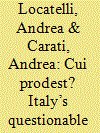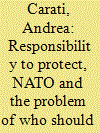|
|
|
Sort Order |
|
|
|
Items / Page
|
|
|
|
|
|
|
| Srl | Item |
| 1 |
ID:
151525


|
|
|
|
|
| Summary/Abstract |
Since the end of the Cold War, Italy has taken part in several multilateral military operations. Many, if not all of them, have implied significant political and human costs for the country. Indeed, the very same contribution to multinational missions in terms of troops deployed bears witness of the importance the country attaches to multilateral missions. In particular, Italy displayed considerable commitment to R2P-inspired interventions. The aim of the paper is then to investigate on the deep causes that drive such an apparently value-oriented foreign policy course. In doing so, it firstly analyses the Italian contribution to multilateral missions. Secondly, the paper discusses which factors can explain such behaviour: international norms, economic and/or security interests, and followership. The paper presents a preliminary test of the drivers of the Italian engagement in multilateral military operations. In this view, it investigates empirically the public debate on Italian participation to relevant R2P-like operations like Kosovo and Libya.
|
|
|
|
|
|
|
|
|
|
|
|
|
|
|
|
| 2 |
ID:
140336


|
|
|
|
|
| Summary/Abstract |
North Atlantic Treaty Organization's (NATO) engagement in Afghanistan represents the most challenging operation in alliance history. Although after 14 years of international intervention the political and socio-economic conditions in Afghanistan have improved, the ongoing withdrawal of international troops is not leaving the country with clear prospects of stability. A vast literature examines the alliance in Afghanistan. An especially relevant important part deals with the USA and NATO mistakes, lessons learned or assessment of the current situation. The origins of NATO's difficulties in Afghanistan are less systematically explored. The consequences of NATO inheriting an ongoing intervention, what it inherited, and the ultimate implications of the distinction between the ‘American war’ and the allied mission remained partially overlooked and obscure. A comprehensive understanding of the origins of what went wrong in allied involvement in Afghanistan is paramount to making sense of the alliance's role today and in the future. This article examines the origins of what NATO inherited in 2003, particularly in the light of the re-Americanization of the conflict during the Obama administration. This analysis focuses on: the consequences of the initial lack of distinction between the Taliban and al-Qaeda; the problems of coordination and competing visions between Enduring Freedom and the International Security Assistance Force; the ideological side of the war on terror which complicated the regional context; and the limited results Obama's strategy achieved. Focusing on the origins of the problems the alliance faces in Afghanistan permits better appreciation of the uniqueness of NATO's intervention and the challenge required to avert the double risk of overestimating or underestimating NATO's actual role in Afghanistan and its implications for the alliance's
|
|
|
|
|
|
|
|
|
|
|
|
|
|
|
|
| 3 |
ID:
156249


|
|
|
|
|
| Summary/Abstract |
One of the most challenging issues concerning the doctrine of the Responsibility to Protect (R2P) is ‘who should intervene’ in case of gross violations of human rights. After the intervention in Kosovo in 1999, the North Atlantic Treaty Organization (NATO) has been increasingly considered a legitimate actor to fulfil the duty to intervene for humanitarian reasons. In 2011, the first military intervention inspired by the R2P in Libya reinforced the appreciation of NATO as a viable enforcer of the doctrine. The paper problematizes the idea that NATO could be a straightforward solution to the problem of who should intervene. NATO's constitutive nature comprises aspects that are at odds with R2P as a normative scheme. In this regard, the paper delves into three aspects: (a) the controversial issue of ‘delegated authority’ from the UN to NATO; (b) the tension between the universalistic character of the R2P and the particularistic nature of NATO and (c) the military nature of the alliance and its consequent focus on security/military considerations that rarely, or just occasionally, match with humanitarian concerns. Finally, the paper analyses the intervention in Libya assessing the incongruities between NATO's military operations and the normative framework of R2P.
|
|
|
|
|
|
|
|
|
|
|
|
|
|
|
|
| 4 |
ID:
191019


|
|
|
|
|
| Summary/Abstract |
Donald Trump was expected to repeal the internationalist approach that had dominated US foreign policy since the end of the Second World War, but his impact was narrower than is commonly supposed. On the one hand, the problems of the liberal international order predate Trump and probably will outlive his presidency. He was more a symptom than the cause of those difficulties, thus his responsibilities should not be overstated. On the other hand, despite several renegotiations and accusations against its partners, the US involvement in multilateral organisations remains solid and its engagement overseas remarkable. Overall, Trump’s performance in shifting US foreign policy toward an anti-globalist stance was quite poor. Contrary to mainstream accounts of Trump’s foreign policy, the president’s revisionism has arguably been thwarted less by the internationalist approach within the foreign policy establishment than by his own personality and his policy-making attitudes.
|
|
|
|
|
|
|
|
|
|
|
|
|
|
|
|
|
|
|
|
|